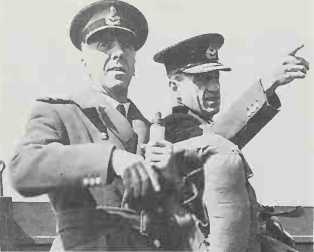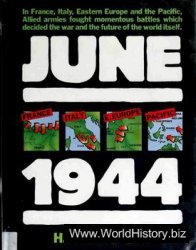Port Stanley. Capital of Falklands. Prior to the invasion of April 1982, a small Royal Marines garrison was based at Moody Brook, a few miles to the west. Stanley became the main Argentinian base, but although it was surrounded with minefields the Argentine garrison did not defend it once their troops were beaten.

Portal (right) with Air Marshal Peirse
Portal, Marshal of the RAF Lord
(1893-1971). Br. Chief of the Air Staff 1940-45. Portal, who had a distinguished flying career in World War I, was noticed by Tren-chard in the early years of the raf. He was Aoc-in-c Bomber Command from April to October 1940 and thereafter cas for the rest of the war. Although a firm believer in the vital importance of air power and, in particular, of the strategic air offensive, he did not subscribe to the opinion that air power alone could determine the outcome of the war. Even so, he came into conflict with his naval and military colleagues on the Chiefs of Staff Committee, especially in the struggle for resources for the build-up of Bomber Command. He differed strongly from his American opposite number, Arnold, as to the latter’s policy of daylight bombing, being a firm believer in the efficacy of night area bombing (although later in the war, he thought that daylight bombing could be used for selective purposes, especially the destruction of German oil production). This brought him into sharp disagreement with Harris whom, however, he decided not to remove from his command. There were some periods of tension between him and Churchill, for example, over the bombing of Dresden, which, though he had originally suggested it, Churchill sought to condemn. But overall. Portal achieved a standing unrivalled in the RAF during the war. ANF.
Poseidon. A MiRved slbm fitted in converted American Polaris submarines from 1970 onwards. Poseidon C-3 can carry up to 14 x 40 kiloton warheads about 2,400 miles (4,000km), but the normal loading is about 10 for a range of 3,120 miles (5,200km). The cep was deliberately kept fairly large to emphasize the counter-value role of the weapon: 1,476ft (450m). Poseidon remains in service in 16 submarines.
Post-Boost Vehicle (PBV). The
Space vehicle or “bus” that carries the warheads in a mirv system. The PBV has the capacity to manoeuvre into a number of different trajectories into each of which it releases a warhead. The Minute-man 3 PBV may take up to six minutes to complete this operation after a three-minute rocket burn by the booster.
Potemkin mutiny (June 27 1905). The 750-strong crew of the Russian Black Sea Fleet battleship Kniaz Potemkin Tauritcheuski mutinied, claiming that seamen had been threatened with execution for refusing tainted rations. Seven officers and one mutineer were killed: official reaction to the “lying-in-state” of the mutineer’s
, corpse on the Odessa quayside provoked riots in which some 6,000 died. Failing to gain support from other Black Sea units, Potemkin s crew scuttled the battleship and surrendered to the authorities in Constanza, Romania.
Potez 63 Series (630.C3, 631.CN2, 633.B2, 63.11) (French, WWII). Heavy fighter/night fighter/light bomber/tactical reconnaissance; crew 3/2/2Z3. Prototype flew April 25 1936. By outbreak of war 379 on French charge. Lack of spares critical; losses heavy; by June 25 1940 survivors totalled 1,049. Germans seized 134 Potez 63s (several sub-types). Production, over 1,350 (all variants). Two 700hp Gnome-Rhone 14 M4/M5 or M6/M7 engines; max. speed 275mph (443kph); armament (varied with function) two 20mm cannon, up to eight 7.5mm machine guns, 8801b (400kg) bombs.
Potsdam Conference (“Terminal”). Meetings between Stalin, Truman and first Churchill, then Attlee, held at Potsdam, near Berlin, July 17-August 2 1945. Discussions about Europe were concerned with the establishment of peacetime frontiers, areas of influence, the trial of war criminals and the division of spoils. Severe disagreements were exposed especially as regards Poland and the Balkans. The war against Japan was discussed and Truman revealed to Stalin that America had produced, and would shortly use, the atomic bomb.
POUM. Partido Obrero de Unifica-cion Marxista — “Spanish workers’ party of Marxist unification”. AntiStalinist group splintered off from orthodox Spanish Communist Party in September 1935. Its main strength lay in Catalonia. Its doctrines were sharply revolutionary; its members took an active part early in the civil war. It was suppressed by Russian agents in Spain and their local helpers in June 1937, and its leader Andres Nin was murdered.
Pound, Adm of the Fleet Sir Dudley (1877-1943). Br. First Sea Lord 1939-43. Highly respected by Churchill, but criticized on the ground that he interfered in too great detail with the actions of the commanders at sea. Such a view fails to recognize that the Admiralty was organized as an operational headquarters where, for example, the most important intelligence first arrived. Nevertheless, some of his decisions, particularly that regarding Convoy PQ 17 in 1942, proved unfortunate. Pound must also share with Churchill much of the blame for the extraordinarily muddled relationship between the naval and military commanders in the Norwegian campaign of April
1940. On the other hand, much of the credit for the preservation of Britain’s most vital sea lanes in the darkest days of the war and for the turn of the tide in the war at sea which occurred in the spring and summer of 1943 is due to Pound. After the collapse of his health, he became decreasingly effective in the second half of 1943, but remained in office until within a few weeks of his death on October 1 1943. ANF.




 World History
World History









